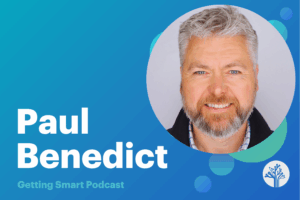21st-Century Skills We Need to Cultivate in Students

By Angela Burgess
A major teaching challenge is determining how to adapt instruction to the demands of the 21st century. Changes in the modern-day workforce and in modern life-styles are so rapid and constant that no single educator can be expected to keep up with it all. We need insights and ideas from our peers.
I had just such a professional learning opportunity when attending a panel discussion during a recent education technology conference. The panel’s main guest speaker was Alan November, an international leader in education technology. The other panel participants were:
- Robert Bayard, Chief Technology Officer for Clear Creek Independent School District in Texas;
- Andrea Winters, Director of Learning Technology for Clear Creek Independent School District;
- Karen Justl, Director of Educational Technology in Spring Branch Independent School District in the Houston area;
- and Beatriz Arnillas, formerly the Director of Education Technology for the Houston Independent School District and the senior education advisor for itslearning (the company that hosted the panel).
Alan asserted that educators should teach students how to learn. As he put it, the traditional school model (in which teachers strive to transfer what they already know to students) is the “content-driven side,” while teaching students how to learn on their own is the “skill side.” He stated, “I think we should begin to move more and more toward the skill side, because if we teach you to memorize and regurgitate content and your job is wiped out by technology, you’re not well prepared to reinvent yourself if you didn’t learn how to learn.”
Karen called for teaching students to set goals for themselves, another skill that would make them more successful in their future jobs (autonomy in the workplace is increasingly expected and encouraged). “We have teachers who work with their kids to develop weekly goals, be more aware, and then reflect,” she said. “And I think that as we get kids involved in the learning process for themselves, that raises their level of thinking.”
Alan shared an innovative way that a Norwegian middle school social studies teacher that he’d met was teaching critical thinking (one of the “four Cs” for future-ready students). “For every unit they were studying, he engaged his students with authentic conversations focused all around the world,” Alan said. For example, when they were studying crime, the class got in touch with a Chicago police officer and a teenager behind bars in the United States, and when they were studying indigenous people, they interviewed indigenous people in Australia. The students had to plan the interview, adjust questioning during it, and reflect on the conversation afterward.
Through this process I’m sure that the students in that class are also learning about the mindsets of different people in different cultures, which, I believe, ties in with another skill that Alan cited from an interview he’d had with the CEO of HSBC, one of the largest banking and financial services in the world. Alan had asked what was the single most important skill that candidates for top-level positions in that organization were missing. The response had been “global empathy.” In other words, empathy for how people work together. The CEO had explained that work was becoming increasingly complicated–for example, designing bridges that had to cross enormous gorges or building massive factories like the Tesla battery plant in Arizona. He’d said that those massive problems needed managers who could not only put together a team, but that also had a deep understanding of people in order to have those team members work well together.
Andrea recalled an article by a representative of a global company who stated that in 2020 there are going to be 10 new skills that his employees would need to have that they currently don’t. The skill that had stood out for her was understanding how to be productive and collaborative while working in a virtual environment. “Not just how to communicate in a virtual environment, but really how to truly be engaged and productive and collaborate to get work done in a virtual environment,” she said.
What may be surprising to many educators is that Alan stated that adults have wildly overestimated what kids know about technology: “They’ve never been taught the grammar and syntax and punctuation of designing a [very specific search engine query]. They don’t understand the algorithm. If we don’t learn these things, these students will continue to basically get crap for information.”
Alan’s words dovetailed with Robert’s call for teaching students how to distinguish between what is accurate and authentic versus what is false or what is embellished–in short, media literacy. As he pointed out, just because students are comfortable using technology to access information, it does not necessarily follow that they have the ability to properly analyze the information.
There’s no single way to teach the skills listed above. We need to find ways to incorporate them as we design our lessons and units. Some quick suggestions include organizing debates to encourage critical thinking, team projects with built-in reflection so they can learn how to work together, and peer-tutoring activities (which could involve video tutorials) so they can understand how learning occurs.
One final takeaway was Beatriz’ description of an activity that helped nurture the search skills Alan recommended: having students access a database or digital library, perform their own searches by keywords and standards, and then having a discussion with them about which of the materials they found are most appropriate for the lesson at hand.
Her rationale for the practice could apply to all the 21st-century skills discussed: “We’re teaching them how to be active digital citizens in a world where data is constantly changing and more information is being added to the daily tasks that we have. We’re teaching them and preparing them to be adaptable, adaptive, flexible, and to survive in this new world where they will have to learn forever.”
For more, see:
- The Future of Work is the Future of Lifelong Learning
- 10 Reasons Why Lifelong Learning is the Only Option
- What’s New in Leadership? Lifelong Learning + Project Management
Angela Burgess is District ITS for Middle & High Schools in Forsyth County (GA) Schools. She’s a Google Certified Educator: Level 2. Follow her on Twitter: @MmeBurgess
Stay in-the-know with all things EdTech and innovations in learning by signing up to receive our weekly newsletter, Smart Update.






0 Comments
Leave a Comment
Your email address will not be published. All fields are required.